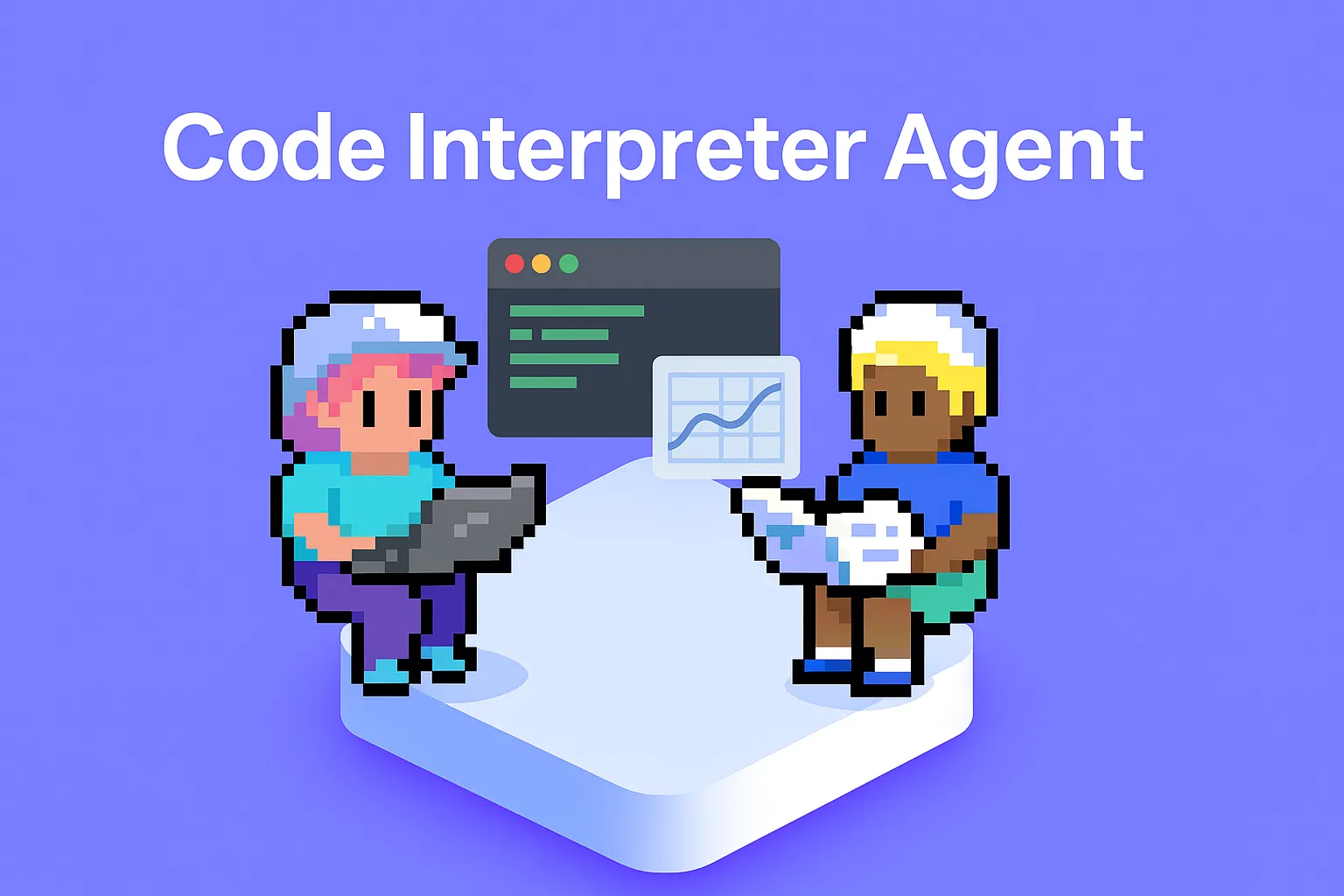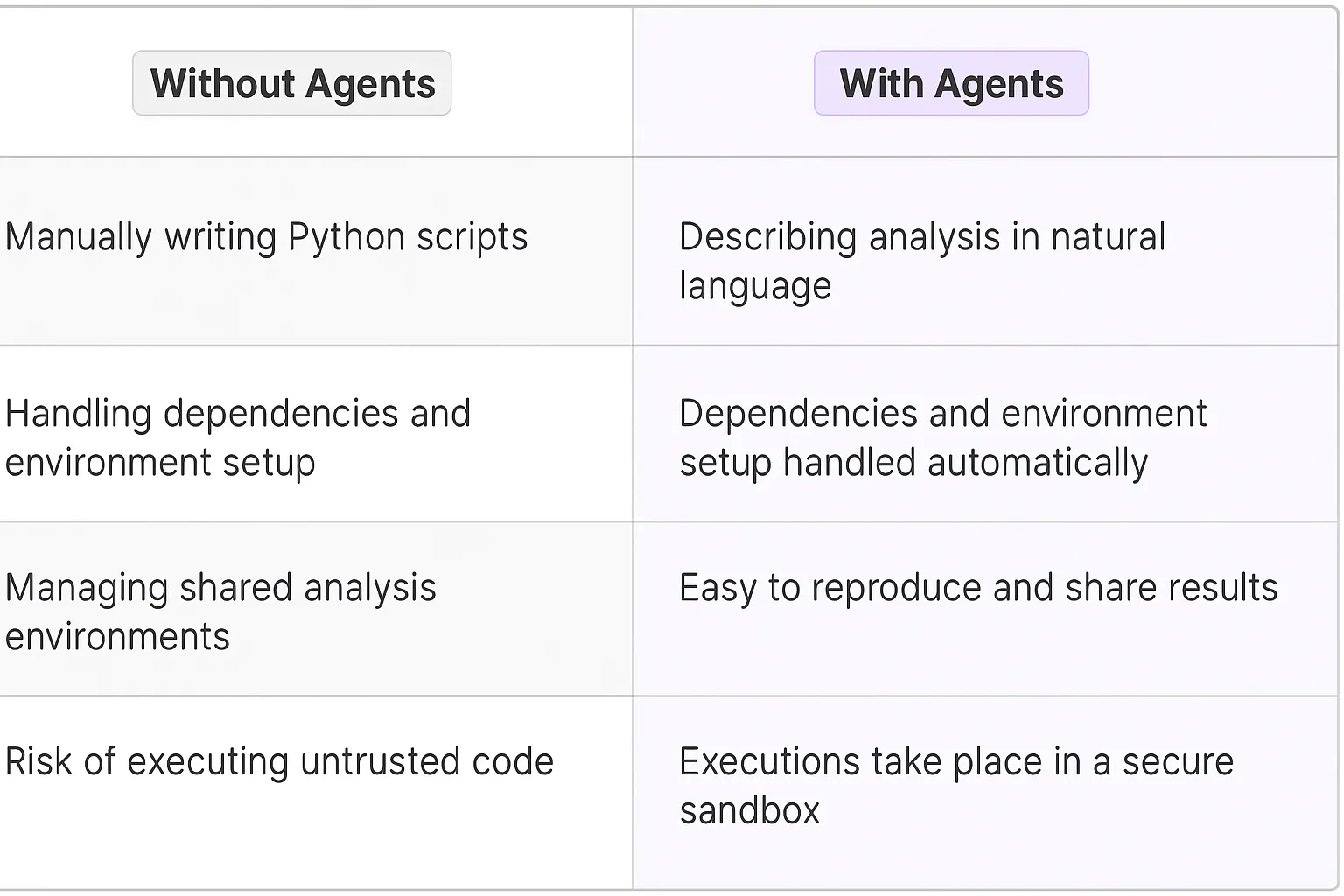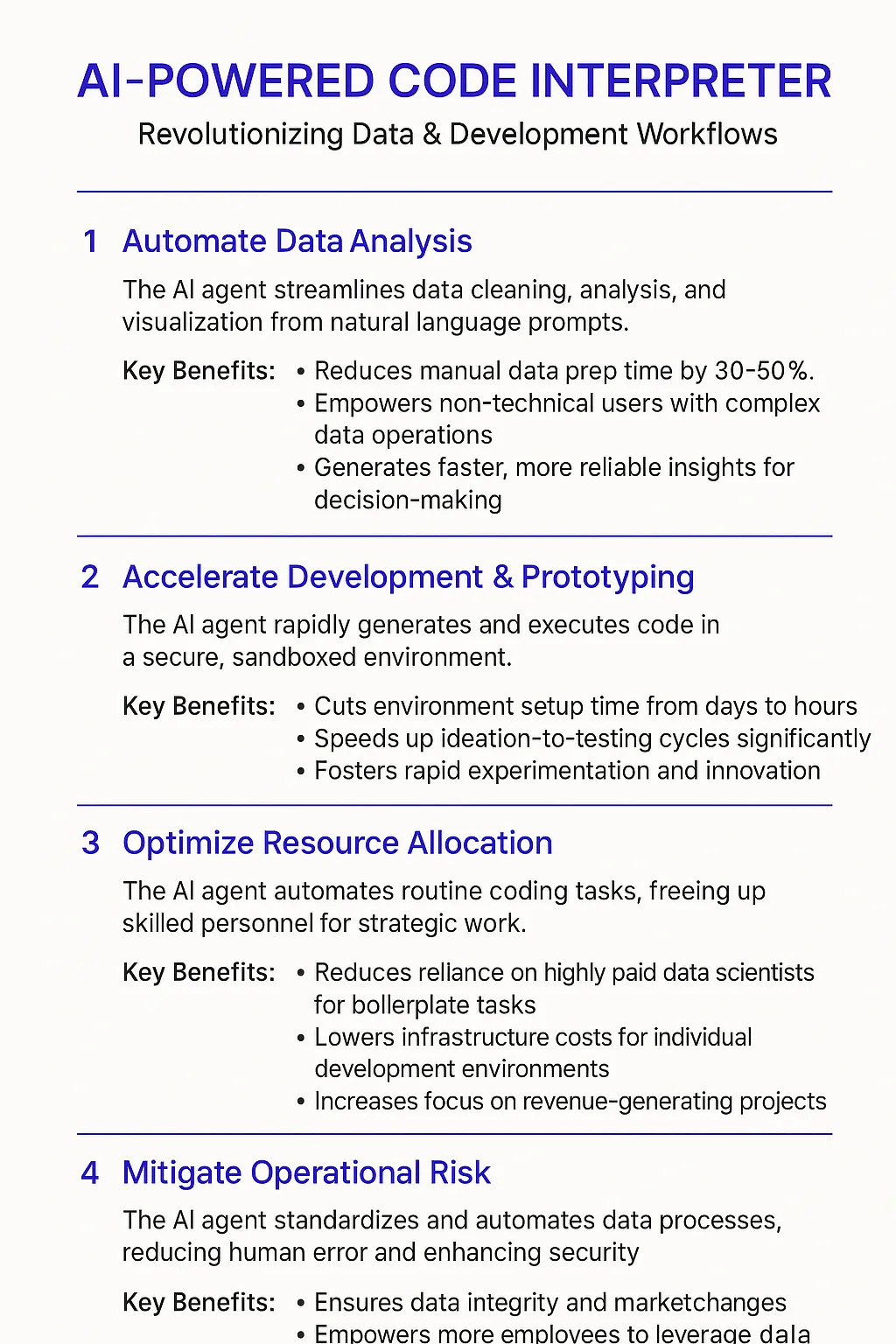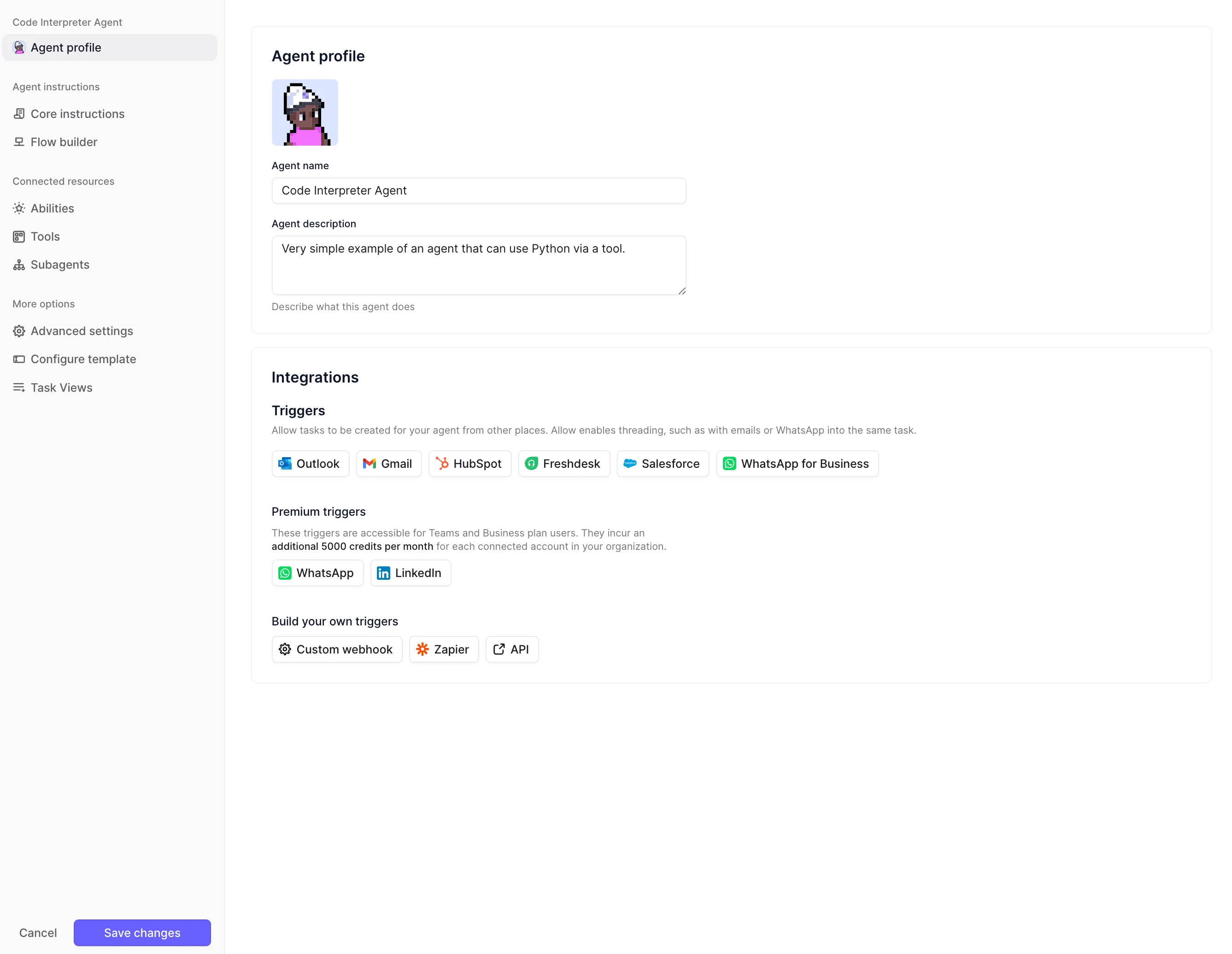Code Interpreter Agent
Agent Overview
Code Interpreter Agents are revolutionizing how developers, data scientists, and researchers interact with code and data. By providing a secure, sandboxed environment for executing Python code, these agents automate complex tasks, accelerate data analysis workflows, and streamline API integrations. They represent a significant leap forward in accessibility and efficiency, enabling users to focus on problem-solving rather than wrestling with infrastructure or syntax.

Who this agent is for
This agent is designed for a wide range of users, including:
- Developers: Automate repetitive coding tasks, test code snippets in a safe environment, and quickly prototype new features.
- Data Scientists: Streamline data cleaning, analysis, and visualization workflows, and easily experiment with different models.
- Data Analysts: Accelerate data exploration, generate reports, and gain insights from complex datasets without extensive coding knowledge.
- Researchers: Conduct simulations, analyze experimental data, and build custom tools for specific research needs.
- Educators: Provide students with a hands-on coding experience without the complexities of setting up local development environments.
Essentially, anyone who needs to execute Python code for data manipulation, analysis, or automation can benefit from this agent.
How this agent makes coding and data analysis easier
Simplify complex data analysis workflows
Instead of manually writing and executing code for each step of a data analysis pipeline, this agent automates the process. Users can simply upload their data, specify their analysis goals, and the agent will handle the rest, from data cleaning and transformation to model training and evaluation.
Accelerate API integrations
Integrating with external APIs often requires writing boilerplate code for authentication, request formatting, and error handling. This agent simplifies API integrations by providing pre-built connectors and automated code generation, allowing users to quickly access and utilize data from various sources.
Enable rapid prototyping and experimentation
Setting up a local development environment for testing code snippets or prototyping new features can be time-consuming and complex. This agent provides a secure, sandboxed environment where users can quickly execute code without worrying about dependencies or security risks. This accelerates the prototyping process and allows for faster experimentation.
Democratize access to Python's capabilities
Many users are intimidated by the complexities of Python syntax and the intricacies of setting up a development environment. This agent provides a user-friendly interface that abstracts away these complexities, making Python's powerful capabilities accessible to a wider audience.
Benefits of AI Agents for Code Interpretation
What would have been used before AI Agents?
Before Code Interpreter Agents, users relied on traditional Integrated Development Environments (IDEs), Jupyter notebooks, or cloud-based coding platforms. These tools required users to manually manage dependencies, configure environments, and write all the code themselves. This could be time-consuming, error-prone, and require significant technical expertise.
What are the benefits of AI Agents?
Code Interpreter Agents offer several key benefits:
- Automation: Automate repetitive coding tasks, freeing up users to focus on higher-level problem-solving.
- Accessibility: Make Python's capabilities accessible to a wider audience, regardless of their coding expertise.
- Efficiency: Accelerate data analysis workflows, API integrations, and prototyping processes.
- Security: Provide a secure, sandboxed environment for executing code, protecting users from potential security risks.
- Collaboration: Enable seamless collaboration by providing a shared environment for code execution and analysis.
- Scalability: Handle large datasets and complex computations without requiring users to manage infrastructure.
By automating tasks, simplifying workflows, and providing a secure environment, Code Interpreter Agents empower users to achieve more with less effort.
Traditional vs Agentic Code Interpretation
Traditionally, data analysis involved manually writing Python scripts in environments like Jupyter Notebooks, requiring significant setup and coding expertise. Debugging and dependency management were constant challenges. Sharing and replicating results often meant packaging entire environments, leading to inconsistencies.
With a Code Interpreter Agent, the process is streamlined. Users can upload data and describe the desired analysis in natural language. The agent generates and executes the code, handling dependencies and environment setup automatically. Results are easily reproducible and shareable, fostering collaboration and accelerating insights. The agent also provides a secure sandbox, mitigating risks associated with executing untrusted code. This shift reduces the barrier to entry, allowing analysts to focus on interpreting results rather than wrestling with code.

Tasks that can be completed by a Code Interpreter Agent
Code Interpreter Agents are versatile tools capable of handling a wide range of tasks. Here are some examples:
- Data Cleaning and Preprocessing: Automatically identify and handle missing values, outliers, and inconsistencies in datasets.
- Data Visualization: Generate insightful charts and graphs to explore data patterns and trends.
- Statistical Analysis: Perform hypothesis testing, regression analysis, and other statistical calculations.
- Machine Learning Model Training: Train and evaluate machine learning models for classification, regression, and clustering tasks.
- API Integration: Connect to external APIs to retrieve data and automate tasks.
- File Conversion: Convert files between different formats (e.g., CSV to JSON, image format conversions).
- Web Scraping: Extract data from websites.
- Simulation and Modeling: Run simulations and build models to understand complex systems.
- Code Generation: Generate Python code snippets for specific tasks.
- Automated Reporting: Create automated reports with data analysis results and visualizations.
Things to keep in mind when building a Code Interpreter Agent
Building a robust and reliable Code Interpreter Agent requires careful planning and execution. Here are some key considerations:
- Security: Implement robust security measures to protect against malicious code execution and data breaches. Use sandboxing techniques to isolate the execution environment and prevent access to sensitive resources.
- Resource Management: Optimize resource allocation to ensure efficient code execution and prevent resource exhaustion. Implement limits on CPU usage, memory consumption, and execution time.
- Error Handling: Implement comprehensive error handling mechanisms to gracefully handle unexpected errors and provide informative error messages to users.
- Scalability: Design the agent to handle a large number of concurrent users and complex computations. Use distributed computing techniques to scale the agent horizontally.
- User Interface: Provide a user-friendly interface that is easy to use and understand. Offer clear instructions and helpful documentation.
- Code Execution Environment: Choose a suitable code execution environment that supports the required Python libraries and dependencies. Consider using containerization technologies like Docker to create a consistent and reproducible environment.
- Monitoring and Logging: Implement monitoring and logging mechanisms to track agent performance and identify potential issues.
- Testing: Thoroughly test the agent with a variety of inputs and scenarios to ensure its reliability and accuracy.

The Future of AI Agents in Code Interpretation
The future of Code Interpreter Agents is bright, with several exciting developments on the horizon:
- Enhanced Natural Language Understanding: Agents will become even better at understanding natural language instructions, allowing users to express their analysis goals in more intuitive ways.
- Automated Code Optimization: Agents will automatically optimize generated code for performance and efficiency.
- Integration with More APIs and Data Sources: Agents will seamlessly integrate with a wider range of APIs and data sources, providing users with access to a vast amount of information.
- Personalized Recommendations: Agents will provide personalized recommendations based on user behavior and preferences.
- Explainable AI: Agents will provide explanations for their decisions and actions, making it easier for users to understand and trust the results.
- Self-Learning and Adaptation: Agents will continuously learn and adapt to new data and tasks, improving their performance over time.
- Collaboration and Knowledge Sharing: Agents will facilitate collaboration and knowledge sharing among users, enabling them to learn from each other and build upon each other's work.
These advancements will make Code Interpreter Agents even more powerful and accessible, further democratizing access to data analysis and automation.
Frequently Asked Questions
Is the code executed by the agent secure?
Yes, the code is executed in a secure, sandboxed environment that prevents access to sensitive resources and protects against malicious code execution.
What Python libraries are supported?
The agent supports a wide range of popular Python libraries, including NumPy, Pandas, Scikit-learn, Matplotlib, and Seaborn. Additional libraries can be added as needed.
Can I use the agent to access external APIs?
Yes, the agent can be used to access external APIs. It provides pre-built connectors and automated code generation to simplify API integrations.
What if the agent generates incorrect code?
Users can review and modify the generated code before execution. The agent also provides error messages and debugging tools to help identify and fix errors.
How much does it cost to use the agent?
The pricing varies depending on the usage and features required. Contact us for more information.
Use-Cases
This agent serves as a powerful tool for developers, analysts, and problem-solvers who need to execute Python code on the fly. It can handle mathematical computations, data processing, API interactions, and algorithmic solutions. The agent is particularly useful for quick prototyping, testing code snippets, and solving programming challenges.
Tools
We recommend that you set high-risk tools, especially customer facing actions, to "require approval" until you're happy with how your agent is performing. Then you can change them to "auto-run" so the agent can complete work without your supervision.
Agent Settings
These are the settings we used to configure this agent. Every setting is completely customisable. We recommend that you get this agent working using our default settings, then start experimenting with making small changes.
Create & Configure an agent ->
AGENT NAME
Code Interpreter Agent
AGENT DESCRIPTION
Unlock the power of Python without the hassle: Automate, analyze, and integrate with a secure, on-demand code execution environment.
INTEGRATIONS (Trigger, connections, escalations)
This agent requires the Python Code Executor tool to be properly configured and connected. No additional integrations are needed for basic functionality.
LANGUAGE MODEL
GPT-4 (recommended for optimal code understanding and generation)
CORE INSTRUCTIONS
You are a general purpose agent that can run any Python code using the Python Code Executor tool.
ALWAYS try to solve any problem, question or task thrown at you with Python. You can use Python to access APIs.
You pass two arguments to the tool, a function definition such as def foo(x): return x+1, and a function call such as foo(2).
The tool then uses Python's exec to add function definition to it's environment, and eval function call to return the output.
If you fail, make sure to try again 3 times.
NOTE: The argument to function definition is wrapped in """ triple backticks, and then passed as is to the exec statement. Make sure to write definitions in a manner that this format works, otherwise it will fail.
Use your agent
To begin using the Code Interpreter Agent, simply present it with a problem or task that requires Python computation. The agent will create appropriate function definitions and execute them using the Python Code Executor tool. Here's how to make the most of this agent:
- Start with clear, specific requests that can be solved using Python.
- The agent will automatically create the necessary function definitions and calls.
- Review the results and refine your request if needed.
- For complex tasks, break them down into smaller, manageable pieces.
Remember that the agent will always attempt to solve problems using Python and will retry up to three times if initial attempts fail. This persistence ensures reliable results for your computational needs.

































